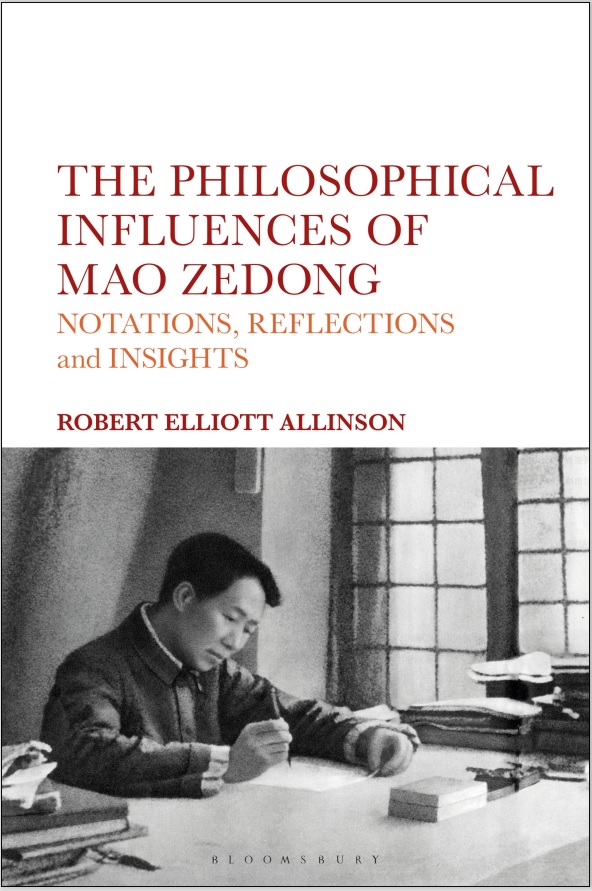Biblioteca / 2020-2029
Robert Elliott Allinson. The Philosophical Influences of Mao Zedong. Notations, Reflections and Insights.
Londres: Bloomsbury, 2020.
220 páginas.
CONTENTS
Foreword
Preface
1 – Introduction to the Philosophical Mao
The Good and the Bad Mao
Traditional Western, Traditional Chinese Philosophy and Mao
Mao’s Individual Thought versus the Official Philosophy of Mao
The pre-Marxist Mao and its Continued Influence
The Place of Frederick Paulsen’s A System of Ethics in Mao’s Thought
Mao and Confucianism: A Preview
The Influence of Philosophy on Mao’s Thinking
2 – Mao’s Youthful Philosophical Development
The Influence of both Western Philosophy and Chinese Philosophy
Mao’s Introduction to Western Philosophy and the Ideas of the West
3 – Mao in the Margins: Mao’s Philosophy of Egoism
The Influence of Paulsen’s A System of Ethics
The Significance of ‘Mao in the Margins’
Paulsen’s, A System of Ethics
The Continuity of Mao’s Thought
Mao’s Views on Ethics
The Idea of the Great Man and the Primacy of the Will
Mao Collapses Moral Instinct into the Instinct for Self-preservation
Mao on Aristotle and Confucius: A Prelude
Mao on Schopenhauer
Mao on Buddhism and Mohism
Mao’s Individualism
Mao and Zhuangzi
Synopsizing Mao’s Views of Egoism and Ethics from his Marginal Notes
The Egoism–Altruism Conundrum
Mao on Aesthetics and Ethics
Mao on Good and Evil
Synopsizing Mao’s Views on Individualism and Society from his Marginal Notes
4 – Mao’s Early Philosophical Influences and Reflections
Confucian and Aristotelian Influences
The Impact of Aristotle’s Ethics on Mao
Aristotle and Confucius
Mao and Mencius
Confucius’s Idea of the Self
Mao’s Interpretation of Confucius
Mao and Confucianism: Universal Love versus Familial Love
Confucius’s Central Ethical Principle
Filial Piety
Mao and Confucianism
Mao and Mencius
Mao on Following One’s Impulses
Mao’s Key Interpretation of Mencius
Mao’s Philosophy of Egoism and his Early Metaphysics
Mao’s Early Metaphysics
The Question of Suicide
Mao Does Not Subscribe to Absolute Evil
Mao as an Existentialist
Mao on Happiness and Virtue
Mao and Nietzsche
The Child is the Father of the Man
Mao and Zhuangzi
5 – The Blend of the Influence of Chinese and Western Philosophy on Mao’s Thought and Parallels in China’s Social and Economic Development
Mao on Confucianism and Paulsen’s Voluntarism
Mao and the Yijing
Mao’s Departure from the Classical Chinese Philosophical Tradition
The Influence of Laozi’s Notorious Chapter Nineteen on Mao’s Cultural Revolution
Mao and Hobbes
Mao and Locke
Mao and Marxism
The Hegelian Dialectic
Mao’s Dialectical Thinking
Flashback to the Beginnings of Mao’s Thought
The Confucian Revival and the Dialectic
6 – Mao’s Marxist Thought and the Yijing
Non-antagonistic and Antagonistic Contradictions
Mao on Endless Struggle
The Principal and the Secondary Aspects of Contradiction
Is Mao Influenced by Soviet Sources?
The Superstructure and the Base: Mao’s Inversion of Classical Marxism
What if Other Scholars Wrote the Works Attributed to Mao?
7 – Mao as Metaphysician and Literatus
Mao as Metaphysician and Philosopher of Science
Is Mao a Western or a Chinese Philosopher?
Mao as Literatus
8 – Mao’s Contributions to Philosophy
Mao’s Philosophical Contributions to Marxism
Mao’s Reduction of All Laws of Dialectics to One
Mao’s Philosophical Contributions to Philosophy Proper
The Primacy of the Will
Mao’s Deviation from Confucius
Mao’s Notion of Continuous Struggle without Resolution
Theory and Practice
Mao and Heracleitus
Mao’s Use of Complementary rather than Contradictory Opposites
